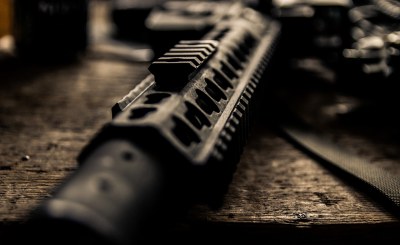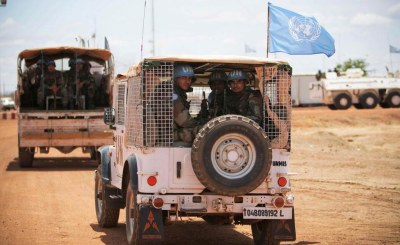-
Africa: How Russia Undermines Democracy in Africa
allAfrica, 27 June 2023
Russia's undermining of democracy in Africa is a serious threat to the continent's stability and development, as it became a key player in Africa's geopolitical landscape, using… Read more »
-
Africa: Wagner Group in Africa - What's Its Future After the Mutiny?
DW, 30 June 2023
Russia's presence in Africa heavily depends on the Wagner Group, headed by Yevgeny Prighozin. But now there is uncertainty about the private military company's role after its… Read more »
-
Africa: Paying Attention to the Wagner Group
This Day, 2 July 2023
The infiltration of the Wagner Group in Africa poses serious threat to the continent's fragile democracies Read more »
-
Africa: Prigozhin's Rebellion Throws Wagner's African Future Into Doubt
ISS, 29 June 2023
Will Wagner boss Yevgeny Prigozhin's astonishing march on Moscow scupper the company's influence on the continent? Read more »
-
Africa: It's Time to Remove the Wagner Killers From Africa
Daily Maverick, 29 June 2023
Watching the implosion of Russia's military cohesion has become an amusing spectator sport. But for Africans, it is deadly serious. While it has risen to global prominence because… Read more »
-
Africa: Wagner Debacle in Russia Raises Red Flags for African States and How They Manage Their Security
The Conversation Africa, 28 June 2023
The brief rebellion led against the Kremlin by the head of the Wagner mercenary forces in Russia last week sent shock waves across the world. Read more »
-
Africa: Africa Gold Advisory
State Department, 27 June 2023
Executive Summary[1] Read more »
-
Central African Republic: U.S. Sanctions Companies Linked to Gold Trade to Fund Wagner Fighters
VOA, 27 June 2023
The United States on Tuesday accused companies in the United Arab Emirates, the Central African Republic and Russia of engaging in illicit gold deals to help fund the mercenary… Read more »
-
Central African Republic: Wagner Group Has Captured CAR - Report
The Sentry, 27 June 2023
Wagner Group's "Nightmarish" Blueprint for Domination Detailed as Central African Republic is Captured as Strategic Beachhead for Russia Read more »
African Countries Face Terror of Wagner Group
The power struggle between President Vladimir Putin and the Wagner Group and its leader Yevgeny Prigozhin will likely have huge implications for Africa. Wagner mercenaries are active in several African countries, including Central African Republic and Mali.
In the Central African Republic, for example, 1,890 so-called "Russian instructors" are supporting government troops in the ongoing civil war, according to the Russian ambassador. The latest report from The Sentry reveals that "systematic efforts by Russia to undercut democracy in Africa have inhibited democratic development in two dozen African countries."
Voice of America reports that the United States has accused companies in the United Arab Emirates, the Central African Republic and Russia of engaging in illicit gold deals to help fund the Wagner Group. The U.S. Treasury Department said in a statement it has sanctioned four companies linked to Wagner and its leader, Yevgeny Prigozhin, that it alleged were used to help pay the paramilitary's forces fighting in Ukraine and undertaking operations to support Russian interests in Africa.
John F. Clark writes for The Conversation that it is easy to understand what African rulers see in the mercenary group. The group's mercenaries can be deployed quickly, and the group brings sophisticated arms with it and can apply force and ruthlessly.
Wagner has been accused of atrocities, including mass murder and rape, across Africa and alongside Russian forces in Ukraine.
In Libya, up to 1,200 Wagner mercenaries are believed to be fighting on the side of rebel leader Khalifa Hifter. In Mali, the pro-Russian, anti-Western military junta has also brought hundreds of Wagner fighters into the country. There, they have been accused of committing serious human rights violations.

One of the recommendations from The Sentry's report on Wagner activities in Central African Republic: UN member states should establish a coalition similar to the Global Coalition to Defeat Daesh/ISIS—critically including African states—to counter the Wagner Group’s malign influence on the African continent and elsewhere by focusing on the group’s finances, movement of foreign fighters, and propaganda.

Russia’s disruption of democratic processes occurs through both official channels (such as blocking UN resolutions condemning African regimes’ human rights abuses or fraudulent electoral claims) and irregular means (such as disinformation campaigns targeting democratic proponents, election interference, the deployment of Wagner paramilitary forces, or illicit arms for resources deals), says Africa Center for Strategic Studies.

Systematic efforts by Russia to undercut democracy in Africa have inhibited democratic development in two dozen African countries.

Russia is ... helping prevent political rights, civil liberties, and checks and balances on the executive branch from gaining traction in some of the continent’s most enduring authoritarian systems. As a result, despite massive popular protests for democracy in places like Algeria, Guinea, Sudan, Uganda, and Zimbabwe, exclusionary regimes persist, the Africa Center for Strategic Studies report says.
Documents
-
27 March 2023
Architects of Terror - The Wagner Group’s Blueprint for State Capture in the Central African Republic
- Publisher:
- The Sentry
- Publication Date:
When the paramilitary organization the Wagner Group--Vladimir Putin's "private army"--first set foot in the Central African Republic (CAR) five years ... see more »





